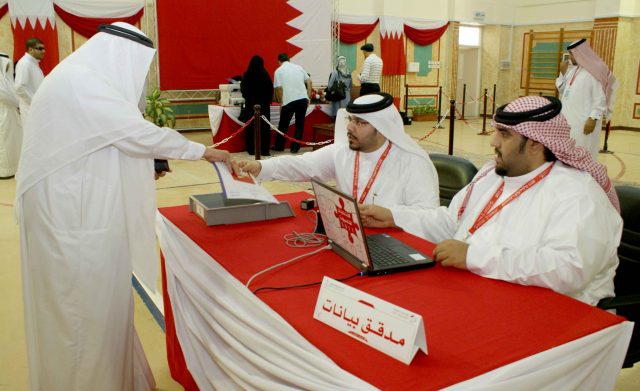As Bahrain’s parliamentary elections approach amid escalating political repression, Americans for Democracy & Human Rights in Bahrain (ADHRB) will be closely monitoring all updates until the vote on 24 November 2018. This blog series, Election Tracker, will follow developments and provide context on the upcoming elections.
![]()
On 18 September 2018, Bahrain’s Minister of Justice, Islamic Affairs, and Endowments, Sheikh Khalid bin Ali Al Khalifa, announced the establishment of a High Elections Committee for the upcoming vote for the lower house of parliament. These elections are scheduled to take place on 24 November, with candidates applying between 17 and 21 October.
Sheikh Khalid chairs the elections committee, which will oversee the election process, including observing the teams assigned to monitor the elections and addressing complaints. Sheikh Khalid has named other committee members including Judge Abdulrahman Al Sayed, Judge Masooma Isa, Judge Khalid Ajaji, Judge Mohammed Al Buainain, Chancellor Wael Buallay, Chancellor Osama Al Oufi, and Judge Mohammed Saeed Al Aradi. He has also established four main supervisor centers, and 40 polling stations have been designated across the kingdom’s four governorates. Twelve polling stations will be located in the Northern Governorate, 10 in the Capital, 10 in the Southern Governorate, and eight in the Muharraq Governorate. It is expected that at least another 10 general polling stations unconnected to any set district will be announced in the coming weeks.
The Bahraini government heavily influences parliamentary votes and there is evidence that an elections committee led by the Ministry of Justice, Islamic Affairs, and Endowments (MOJ) will be incapable of impartially monitoring the process. Bahrain’s judiciary lacks independence from the monarchy, with most senior officials or judges either members of the ruling Al Khalifa family or foreign nationals on temporary contracts with the government. Justice Minister Sheikh Khalid, chair of the High Elections Committee, has overseen Bahrain’s skyrocketing mass incarceration problem since 2011, with the courts routinely permitting due process violations, accepting testimony extracted by torture, and handing down harsh sentences for politically motivated offenses with no basis in international law. The minister himself has consistently defended politically motivated prosecutions, such as the internationally condemned case against 47 medical professionals for alleged “efforts to bring down the Sunni monarchy and spread false news” in 2011. A member of a hardline anti-Shia Muslim faction of the ruling family, known as the Khawalid, Sheikh Khalid has also been implicated in discrimination against the country’s Shia majority population: as minister of Islamic affairs as well as justice, it is believed he supervised the systematic destruction of Shia mosques and religious structures in 2011, and he has repeatedly justified the operation.
Sheikh Khalid and the MOJ have also directly intervened to suppress independent political opposition. In 2012, the MOJ launched dissolution proceedings against the Amal opposition society, and ahead of the 2014 elections it arbitrarily suspended both Al-Wefaq and Wa’ad – Bahrain’s other two major registered opposition groups. In 2015 it threatened to close the smaller opposition society Al-Wahdawi, and in 2016 and 2017 it launched dissolution proceedings against Al-Wefaq and Wa’ad.
There is additionally no indication that the High Elections Committee is taking steps to rectify longstanding problems like gerrymandering. The principle of ‘one person, one vote’ does not exist in Bahrain, as the government has typically created districts along political and sectarian lines to lend unfair advantage to preferred candidates. Authorities have specifically redistricted to dilute the influence of the marginalized Shia community, amplify that of government supporters, and prevent opposition groups from winning a majority in parliament. In 2010, for example, the average Shia-majority district contained 9,533 constituents compared with just 6,186 for the average Sunni-majority district; likewise, while Al-Wefaq received about 64 percent of the national vote, it earned the society just 18 out of 40 parliamentary seats.
Moreover, reports that the High Elections Committee will authorize at least 10 general polling stations raise the risk of electoral manipulation. The authorities grant dual citizenship to Sunni Saudi nationals and expedite citizenship for foreign Sunnis employed in the security forces in order to further alter the country’s demographics and influence voting patterns. In the past the government has reportedly transported these groups to general polling stations located along the border and in other remote areas, complicating any good faith monitoring efforts. Though Bahrain has previously invited some international election observers, these are typically not independent delegations, and they have not been able to monitor these isolated polling stations.
With no truly independent monitoring system in place, and the government’s history of interfering in the election process, Bahrain will not see a free and fair election this fall.





